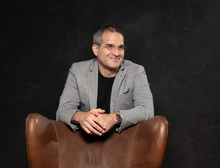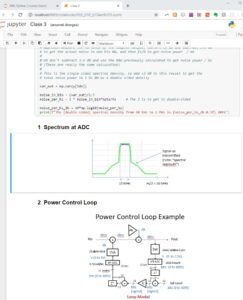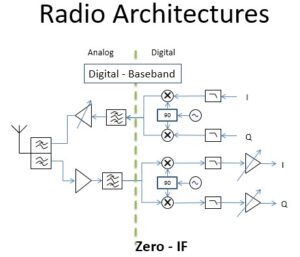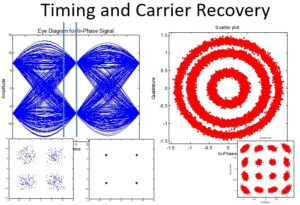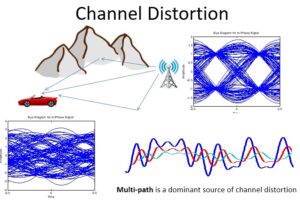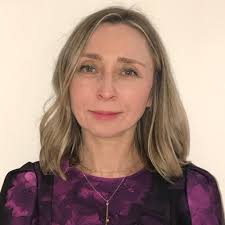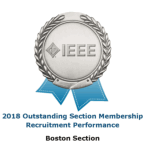IEEE Boston Section
News & Announcements!
IEEE Boston Section – Call for Committee Volunteers!
Upcoming Events!
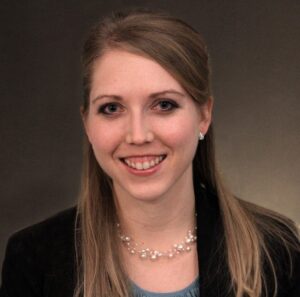 Jessica E. Ruyle (M’05–SM’16) was born in Shawnee, OK USA in 1984. She received a B.S. degree in electrical engineering from Texas A&M University, College Station in 2006 and an M.S and Ph.D. degree in electrical engineering from the University of Illinois at Urbana-Champaign in 2008 and 2011 respectively. From 2006 to 2011, she was a Graduate Research Assistant at the University of Illinois at Urbana-Champaign. From 2012 to 2019, she was an Assistant Professor with the School of Electrical and Computer Engineering, University of Oklahoma, Norman. In 2019 she was promoted to Associate Professor in Electrical and Computer Engineering at the University of Oklahoma. She is an Advanced Radar Research Center (ARRC) member at the University of Oklahoma (OU). She holds two patents for her antenna designs. Her research interests are in the development and characterization of new electromagnetic devices and platforms such as antennas and packaging to improve the performance of radiating systems in challenging environments. Prof. Ruyle is a member of Tau Beta Pi and Eta Kappa Nu. She is the recipient of a DARPA Young Faculty Award for her work in highly conformal, placement insensitive antennas and was named a William H. Barkow Presidential Professor at OU. She is also an IEEE Senior Member and an Associate Editor for IEEE Antennas and Wireless Propagation Letters.
Jessica E. Ruyle (M’05–SM’16) was born in Shawnee, OK USA in 1984. She received a B.S. degree in electrical engineering from Texas A&M University, College Station in 2006 and an M.S and Ph.D. degree in electrical engineering from the University of Illinois at Urbana-Champaign in 2008 and 2011 respectively. From 2006 to 2011, she was a Graduate Research Assistant at the University of Illinois at Urbana-Champaign. From 2012 to 2019, she was an Assistant Professor with the School of Electrical and Computer Engineering, University of Oklahoma, Norman. In 2019 she was promoted to Associate Professor in Electrical and Computer Engineering at the University of Oklahoma. She is an Advanced Radar Research Center (ARRC) member at the University of Oklahoma (OU). She holds two patents for her antenna designs. Her research interests are in the development and characterization of new electromagnetic devices and platforms such as antennas and packaging to improve the performance of radiating systems in challenging environments. Prof. Ruyle is a member of Tau Beta Pi and Eta Kappa Nu. She is the recipient of a DARPA Young Faculty Award for her work in highly conformal, placement insensitive antennas and was named a William H. Barkow Presidential Professor at OU. She is also an IEEE Senior Member and an Associate Editor for IEEE Antennas and Wireless Propagation Letters. IEEE Boston/Providence/New Hampshire Reliability Chapter
FREE In Person and Virtual Event
Measuring the Reliability of new technology is critical for any development team. Accelerated Life Testing (ALT) measures a new product’s life by testing at elevated stresses. It saves valuable time & resources; giving teams the right information rapidly. Join this webinar to get an overview of ALT and a few tips and tricks to ensure you avoid common pitfalls.
Measuring the Reliability of new technology is critical for any development team. Accelerated Life Testing (ALT) measures a new product’s life by testing at elevated stresses. It saves valuable time & resources; giving teams the right information rapidly. Join this webinar to get an overview of ALT and a few tips and tricks to ensure you avoid common pitfalls.
Agenda:
5:30 PM Pizza, salad, soft drinks, and Networking
6:00 PM Technical Presentation
6:45 PM Questions and Answers
7:00 PM Adjournment
Biography: Adam Bahret of Apex Ridge Reliability Consulting
Adam Bahret is the founder of Apex Ridge Consulting and a leading reliability expert who writes, speaks and coaches engineering teams on reliability as a competitive edge. His reliability strategy has delivered millions in savings for clients while mitigating risk and forming a foundation for reliability-fueled growth and brand dominance. His clients range across multiple industry segments, including medical devices, robotics, semiconductor, aerospace, consumer, and automotive.
Adam works with technical teams to improve the design while mentoring leadership teams in adopting the processes, language, and behaviors to build a reliability culture. He also introduces key reliability metrics such as “time-to-reliability” that guide organizational thinking and build a robust reliability culture that’s the hallmark of dominant top-performing technology companies.
Adam is the author of three books on reliability engineering: Devastate the Competition, How to Take Market Share Through Robust Design (2023), Reliability Culture, How Leaders Build Organizations that Create Reliable Products (Wiley 2021), and How Reliable is Your Product, 50 Ways to Improve Product Reliability (2nd Ed 2016). Adam has also released a series of small handbooks on specific reliability tools called “Adam’s The Perfect Reliability Tool” book series. “The Perfect HALT”, “The Perfect Accelerated Life Test”, “The Perfect Reliability Growth Test”, and “ The Perfect DFMEA.”
Adam has deep technical expertise and over 25 years of experience in product development and reliability engineering. He has an MS in Mechanical Engineering from Northeastern University, is an ASQ nationally certified reliability engineer, and an international speaker on technology, leadership, and product development. More information on Adam and Apex Ridge can be found at www.adambahret.com.
The meeting is open to all. You do not need to belong to the IEEE to attend this event; however, we welcome your consideration of IEEE membership as a career enhancing technical affiliation.
There is no cost to register or attend, but registration is required (so that we may purchase enough food!)
Registration: https://events.vtools.ieee.org/m/415811
COURSE DESCRIPTION
Digital Signal Processing (DSP) for Software Radio
Course Kick-off / Orientation 6:00PM – 6:30PM EDT; Thursday, June 13, 2024
First Video Release, Thursday, June 13, 2024. Additional videos released weekly in advance of that week’s live session!
Live Workshops: 6:00PM – 7:30PM EDT; Thursdays, June 20, 27, July 11, 18, 25
Registration is open through the last live workshop date. Live workshops are recorded for later use.
Course Information will be distributed on Thursday, June 13, 2024 in advance of and in preparation for the first live workshop session. A live orientation session will be held on Thursday, June 13, 2024.
Attendees will have access to the recorded session and exercises for two months (until August 20, 2024) after the last live session ends!
IEEE Member Early Rate (by June 6th): $190.00
IEEE Member Rate (after June 6th): $285.00
IEEE Non-Member Early Rate (by June 6th): $210.00
IEEE Non-Member Rate (after June 6th): $315.00
Decision to run/cancel course: Course will run!
Speaker: Dan Boschen
This is a hands-on course combining pre-recorded lectures with live Q&A and workshop sessions in the popular and powerful open-source Python programming language.
Pre-Recorded Videos: The course format includes pre-recorded video lectures that students can watch on their own schedule, and an unlimited number of times, prior to live Q&A workshop sessions on Zoom with the instructor. The videos will also be available to the students for viewing for up to two months after the conclusion of the course.
Course Summary
This course builds on the IEEE course “DSP for Wireless Communications” also taught by Dan Boschen, further detailing digital signal processing most applicable to practical real-world problems and applications in radio communication systems. Students need not have taken the prior course if they are familiar with fundamental DSP concepts such as the Laplace and Z transform and basic digital filter design principles.
This course brings together core DSP concepts to address signal processing challenges encountered in radios and modems for modern wireless communications. Specific areas covered include carrier and timing recovery, equalization, automatic gain control, and considerations to mitigate the effects of RF and channel distortions such as multipath, phase noise and amplitude/phase offsets.
Dan builds an intuitive understanding of the underlying mathematics through the use of graphics, visual demonstrations, and real-world applications for mixed signal (analog/digital) modern transceivers. This course is applicable to DSP algorithm development with a focus on meeting practical hardware development challenges, rather than a tutorial on implementations with DSP processors.
Now with Jupyter Notebooks!
This long-running IEEE Course has been updated to
include Jupyter Notebooks which incorporates graphics together with Python simulation code to provide a “take-it-with-you” interactive user experience. No knowledge of Python is required but the notebooks will provide a basic framework for proceeding with further signal processing development using that tools for those that have interest in doing so.
This course will not be teaching Python, but using it for demonstration. A more detailed course on Python itself is covered in a separate IEEE Course routinely taught by Dan titled “Python Applications for Digital Design and Signal Processing”.
All set-up information for installation of all tools used will be provided prior to the start of class.
Target Audience:
All engineers involved in or interested in signal processing for wireless communications. Students should have either taken the earlier course “DSP for Wireless Communications” or have been sufficiently exposed to basic signal processing concepts such as Fourier, Laplace, and Z-transforms, Digital filter (FIR/IIR) structures, and representation of complex digital and analog signals in the time and frequency domains. Please contact Dan at boschen@loglin.com if you are uncertain about your background or if you would like more information on the course.
Benefits of Attending/ Goals of Course:
Attendees will gain a strong intuitive understanding of the practical and common signal processing implementations found in modern radio and modem architectures and be able to apply these concepts directly to communications system design.
Pre-recorded lectures (3 hours each) will be distributed Friday prior to each week’s workshop dates. Workshop / Q&A sessions are 6:00PM – 7:30PM on the dates listed below.
Kick-off / Orientation: Thursday, June 13, 2024
Topics / Schedule:
Class 1: Thursday, June 20: DSP Review, Radio Architectures, Digital Mapping, Pulse Shaping, Eye Diagrams
Class 2: Thursday, June 27, 2024: ADC Receiver, CORDIC Rotator, Digital Down Converters, Numerically Controlled Oscillators
Class 3: Thursday, July 11, 2024: Digital Control Loops; Output Power Control, Automatic Gain Control
Class 4: Thursday, July 18, 2024: Digital Control Loops; Carrier and Timing Recovery, Sigma Delta Converters
Class 5: Thursday, July 25, 2024: RF Signal Impairments, Equalization and Compensation, Linear Feedback Shift Registers
Speaker’s Bio:
Dan Boschen has a MS in Communications and Signal Processing from Northeastern University, with over 25 years of experience in system and hardware design for radio transceivers and modems. He has held various positions at Signal Technologies, MITRE, Airvana and Hittite Microwave designing and developing transceiver hardware from baseband to antenna for wireless communications systems and has taught courses on DSP to international audiences for over 15 years. Dan is a contributor to Signal Processing Stack Exchange https://dsp.stackexchange.com/, and is currently at Microchip (formerly Microsemi and Symmetricom) leading design efforts for advanced frequency and time solutions.
For more background information, please view Dan’s Linked-In page at: http://www.linkedin.com/in/danboschen
Consultant’s Network
Visit us at: https://bostonconsultants.org
Registration: https://bostonconsultants.org/event-5740097
Free lunch starts at 12:00 PM
Meeting starts at 1:00 PM – On-site and Zoom
Members in good standing are encouraged to attend. If you are unable to attend, then we will also be on Zoom.
Your registration confirmation email contains the Zoom details.
CNET Consultant Profile
David Connor
An IEEE Member for more than 42 years, David is the founder and president of Striper Solutions LLC. He brings many years of successful experience in engineering consulting for product development and regulatory compliance
Join us!
Power & Energy Society
Speaker: Marianna Vaiman, CEO of V&R Energy
Time: Refreshments start at 6:00pm; Talk begins at 6:30pm
(Free Parking at West Parking Lot)
As the electric grid undergoes significant transformations and becomes increasingly affected by more frequent and severe weather events, the resilience and reliability of transmission and distribution systems become extremely important. The advancement of Energy Management Systems (EMS) is crucial for maintaining the reliable operation of power systems. A Phasor Measurement Unit (PMU)-based framework enhances state estimation accuracy, thereby improving the effectiveness of modern EMS applications, such as security assessments. By leveraging synchronized measurements, this framework enhances the reliability and efficiency of EMS, optimizing system operation and performance. The changing energy generation mix, the growth of DERs, and the integration of renewable energy resources at both large scale and individual user level necessitate stronger grid resilience and greater consumer choice. To meet these evolving requirements, enhanced real-time visibility and control of bidirectional energy flows across the distribution grid are essential. The deployment of advanced technologies, such as the Distribution Linear State Estimator (DLSE), is key to addressing these challenges. This presentation will discuss the critical roles of PMU-based EMS and network analysis applications, and DLSE in enhancing the situational awareness, analysis, monitoring, and control of modern transmission and distribution systems, ensuring their resilient and reliable operation.
Biography – Marianna Vaiman
Marianna Vaiman is the Co-founder and CEO of V&R Energy. She has over 30 years of experience in the development and deployment of innovative technologies for the electric utility industry. She has B.Sc. and M.Sc. in Electrical Engineering and her areas of expertise include stability, resilience, optimization, and control in power systems with high penetration of inverter-based resources; use of synchrophasor measurements for enhanced situational awareness and control; use of machine learning; and analysis of cascading outages. Marianna is an IEEE Fellow and has been recognized as IEEE PES Women Engineers and Achievers in Power & Energy. She is a member of Power & Energy Magazine Editorial Board, the immediate past Co-Chair of IEEE PES Corporate Engagement Program, a member of IEEE PES Industry Technical Support Leadership Committee, a member of Long-Range Planning subcommittee, and a VP of Marketing at CIGRE US National Committee. She’s active in NERC, WECC, and NASPI communities.
Free and Open to the Public; RSVP is appreciated Visit the IEEE PES Boston Chapter website for further details – https://site.ieee.org/boston-pes/
For any questions regarding this presentation or any IEEE PES Boston Technical Meetings, please contact: Risa Karanxha (risa.karanxha@nationalgrid.com) or Chris Sweeny (christopher.sweeny@1898andco.com)
IEEE Boston Section recognized for Excellence in Membership Recruitment Performance
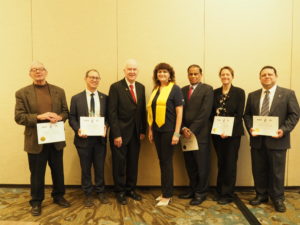
IEEE Boston Section was founded Feb 13, 1903, and serves more than 8,500 members of the IEEE. There are 29 chapters and affinity groups covering topics of interest from Aerospace & Electronic Systems, to Entrepreneur Network to Women in Engineering to Young Professionals. The chapters and affinity groups organize more than 100 meetings a year. In addition to the IEEE organization activities, the Boston Section organizes and sponsors up to seven conferences in any given year, as well as more than 45 short courses. The Boston Section publishes a bi-weekly newsletter and, currently, a monthly Digital Reflector newspaper included in IEEE membership.
The IEEE Boston Section also offers social programs such as the section annual meeting, Milestone events, and other non-technical professional activities to round out the local events. The Section also hosts one of the largest and longest running entrepreneurial support groups in IEEE.
More than 150 volunteers help create and coordinate events throughout the year.
Click here to join our email list!
